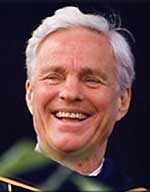Along with assuming the expected challenges of leading a state university system when he took on the presidency of the University of California (UC) in 1995, Richard Atkinson immediately faced a crisis that not only affected his new position, but that had implications for U-M and all of higher education.

The UC Board of Regents had just voted to abolish the use of race and ethnicity as factors in the admissions process. The regents’ decision focused attention on affirmative action programs in higher education. New challenges to admissions processes at U-M and other major universities were mounted, eventually leading to the historic 2003 Supreme Court decisions on U-M’s admissions policies that upheld the use of race as one of many factors in creating a diverse student body.
Now president emeritus of UC, Atkinson will be on campus May 18 to deliver the Third Annual Nancy Cantor Distinguished Lectureship on Intellectual Diversity. His address, “Opportunity in a Democratic Society: A National Agenda,” is the centerpiece of a national conference titled “Futuring Diversity: Creating a National Agenda.”
The annual lectureship honors Cantor, former U-M provost and current chancellor of Syracuse University, for her unflagging commitment to diversity and outstanding contributions to the University community. The lecture is supported by the Office of the Senior Vice Provost for Academic Affairs in collaboration with the Provost’s Faculty Committee on Education for a Diverse Democracy.
A panel discussion on the role of higher education in promoting a diverse democracy will follow Atkinson’s lecture, which begins at 10 a.m. in Rackham Auditorium.
Beyond the UC regents’ decision, Atkinson points to the passage in 1996 of Proposition 209, which banned the consideration of race and ethnicity in all public entities in California. He says it made UC a case study in how an elite public university—required to employ admissions policies that demonstrably are inclusive and fair—responded to the end of almost 30 years of affirmative action.
“On May 18, I’ll discuss the lessons of that experience and why we need to rethink affirmative action in the light of far-reaching changes in American society today,” Atkinson says.
Among the responses to these challenges, he says, UC launched new initiatives to recruit a highly qualified diverse student body, which included expanding partnerships with K-12 schools and challenging higher education’s reliance on aptitude tests as an index of students’ readiness for college.
During his eight years as the 17th president of the California system, Atkinson’s innovative approaches to admissions and outreach expanded access to the UC campuses for an increasingly diverse population; prompted research initiatives to accelerate UC’s contributions to the state’s economy; and mounted a challenge to the country’s most widely used admissions examination—the SAT 1—paving the way for major changes in the way millions of America’s youth are tested for college admission.
Prior to assuming the UC presidency, Atkinson served for 15 years as chancellor of UC, San Diego, where he led that campus’ emergence as one of the leading research universities in the nation.
He is a former director of the National Science Foundation, a past president of the American Association for the Advancement of Science, and a former faculty member at Stanford University, where his research in the field of cognitive science and psychology concerned problems of memory and cognition.
Atkinson is a member of the National Academy of Sciences, the Institute of Medicine, the National Academy of Education, and the American Philosophical Society. He also has received an unusual honor for a college president—a mountain in Antarctica was named in his honor.
Details about the Futuring Diversity conference are available at:
http://www.diversity.umich.edu/futuring/conference.html.

